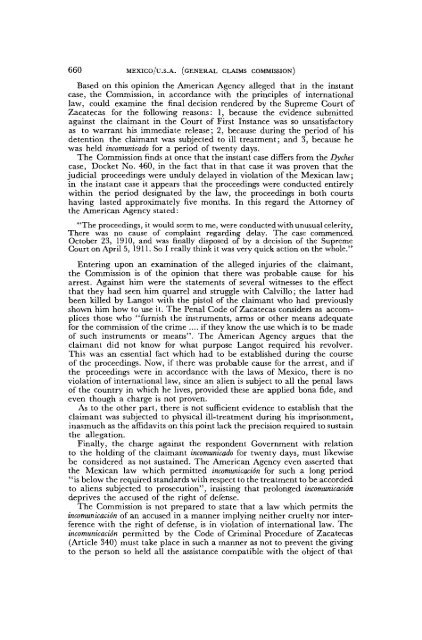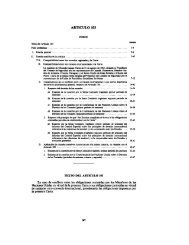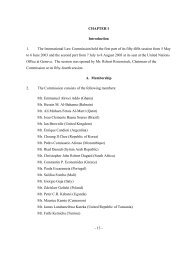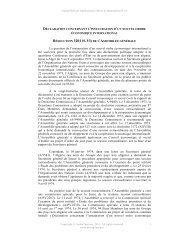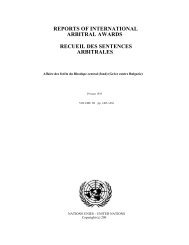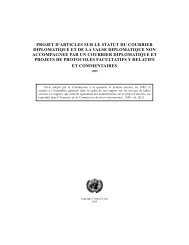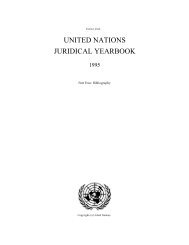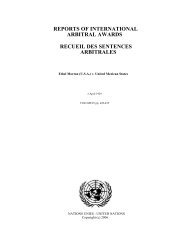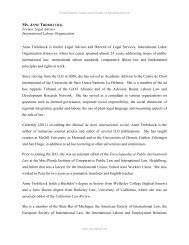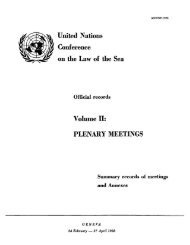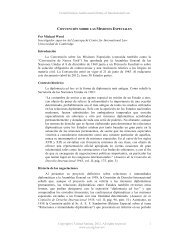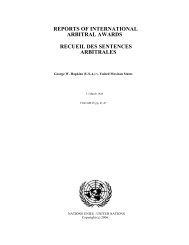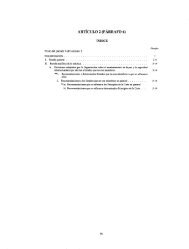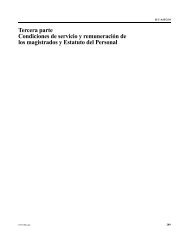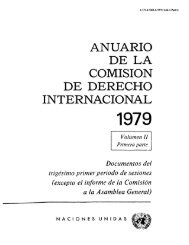Joseph A. Farrell (U.S.A.) v. United Mexican States - United Nations ...
Joseph A. Farrell (U.S.A.) v. United Mexican States - United Nations ...
Joseph A. Farrell (U.S.A.) v. United Mexican States - United Nations ...
You also want an ePaper? Increase the reach of your titles
YUMPU automatically turns print PDFs into web optimized ePapers that Google loves.
660 MEXICO/U.S.A. (GENERAL CLAIMS COMMISSION)<br />
Based on this opinion the American Agency alleged that in the instant<br />
case, the Commission, in accordance with the principles of international<br />
law, could examine the final decision rendered by the Supreme Court of<br />
Zacatecas for the following reasons: 1, because the evidence submitted<br />
against the claimant in the Court of First Instance was so unsatisfactory<br />
as to warrant his immediate release; 2, because during the period of his<br />
detention the claimant was subjected to ill treatment; and 3, because he<br />
was held incomunicado for a period of twenty days.<br />
The Commission finds at once that the instant case differs from the Dyches<br />
case, Docket No. 460, in the fact that in that case it was proven that the<br />
judicial proceedings were unduly delayed in violation of the <strong>Mexican</strong> law;<br />
in the instant case it appears that the proceedings were conducted entirely<br />
within the period designated by the law, the proceedings in both courts<br />
having lasted approximately five months. In this regard the Attorney of<br />
the American Agency stated:<br />
"The proceedings, it would seem to me, were conducted with unusual celerity,<br />
There was no cause of complaint regarding delay. The case commenced<br />
October 23, 1910, and was finally disposed of by a decision of the Supreme<br />
Court on April 5, 1911. So I really think it was very quick action on the whole."<br />
Entering upon an examination of the alleged injuries of the claimant,<br />
the Commission is of the opinion that there was probable cause for his<br />
arrest. Against him were the statements of several witnesses to the effect<br />
that they had seen him quarrel and struggle with Calvillo; the latter had<br />
been killed by Langot with the pistol of the claimant who had previously<br />
shown him how to use it. The Penal Code of Zacatecas considers as accomplices<br />
those who "furnish the instruments, arms or other means adequate<br />
for the commission of the crime .... if they know the use which is to be made<br />
of such instruments or means". The American Agency argues that the<br />
claimant did not know for what purpose Langot required his revolver.<br />
This was an essential fact which had to be established during the course<br />
of the proceedings. Now, if there was probable cause for the arrest, and if<br />
the proceedings were in accordance with the laws of Mexico, there is no<br />
violation of international law, since an alien is subject to all the penal laws<br />
of the country in which he lives, provided these are applied bona fide, and<br />
even though a charge is not proven.<br />
As to the other part, there is not sufficient evidence to establish that the<br />
claimant was subjected to physical ill-treatment during his imprisonment,<br />
inasmuch as the affidavits on this point lack the precision required to sustain<br />
the allegation.<br />
Finally, the charge against the respondent Government with relation<br />
to the holding of the claimant incomunicado for twenty days, must likewise<br />
be considered as not sustained. The American Agency even asserted that<br />
the <strong>Mexican</strong> law which permitted incomunicaciôn for such a long period<br />
"is below the required standards with respect to the treatment to be accorded<br />
to aliens subjected to prosecution", insisting that prolonged incomunicaciôn<br />
deprives the accused of the right of defense.<br />
The Commission is not prepared to state that a law which permits the<br />
incomunicaciôn of an accused in a manner implying neither cruelty nor interference<br />
with the right of defense, is in violation of international law. The<br />
incomunicaciôn permitted by the Code of Criminal Procedure of Zacatecas<br />
(Article 340) must take place in such a manner as not to prevent the giving<br />
to the person so held all the assistance compatible with the object of that


